Advanced Information Systems Design: ERP Implementation Proposal
VerifiedAdded on 2023/06/15
|7
|1203
|235
Project
AI Summary
This document presents an ERP implementation proposal for ABC Pvt. Ltd., a stationary product manufacturer aiming to automate its business processes. The proposal identifies the problem of manual operations leading to errors and inefficiencies, emphasizing the significance of ERP in reducing costs and redundancies. Key objectives include decreasing manual system challenges by 90% and improving data accuracy by 80%. Deliverables encompass ERP system proposal, planning, implementation, data migration, data cleansing, technology transfer, and employee training. The methodology adopts a waterfall approach, detailing requirement analysis, design, development, testing, and maintenance phases. The proposal also addresses potential risks like improper management, budget estimation, and software vulnerabilities, along with mitigation strategies. The project budget is estimated at $50 million, highlighting the need for experienced project managers and thorough business analysis.

Running head: ADVANCED INFO SYSTEMS DESIGN: PROPOSAL
Advanced Info systems Design: Proposal
Name of the Student
Name of the University
Author Note
Advanced Info systems Design: Proposal
Name of the Student
Name of the University
Author Note
Paraphrase This Document
Need a fresh take? Get an instant paraphrase of this document with our AI Paraphraser
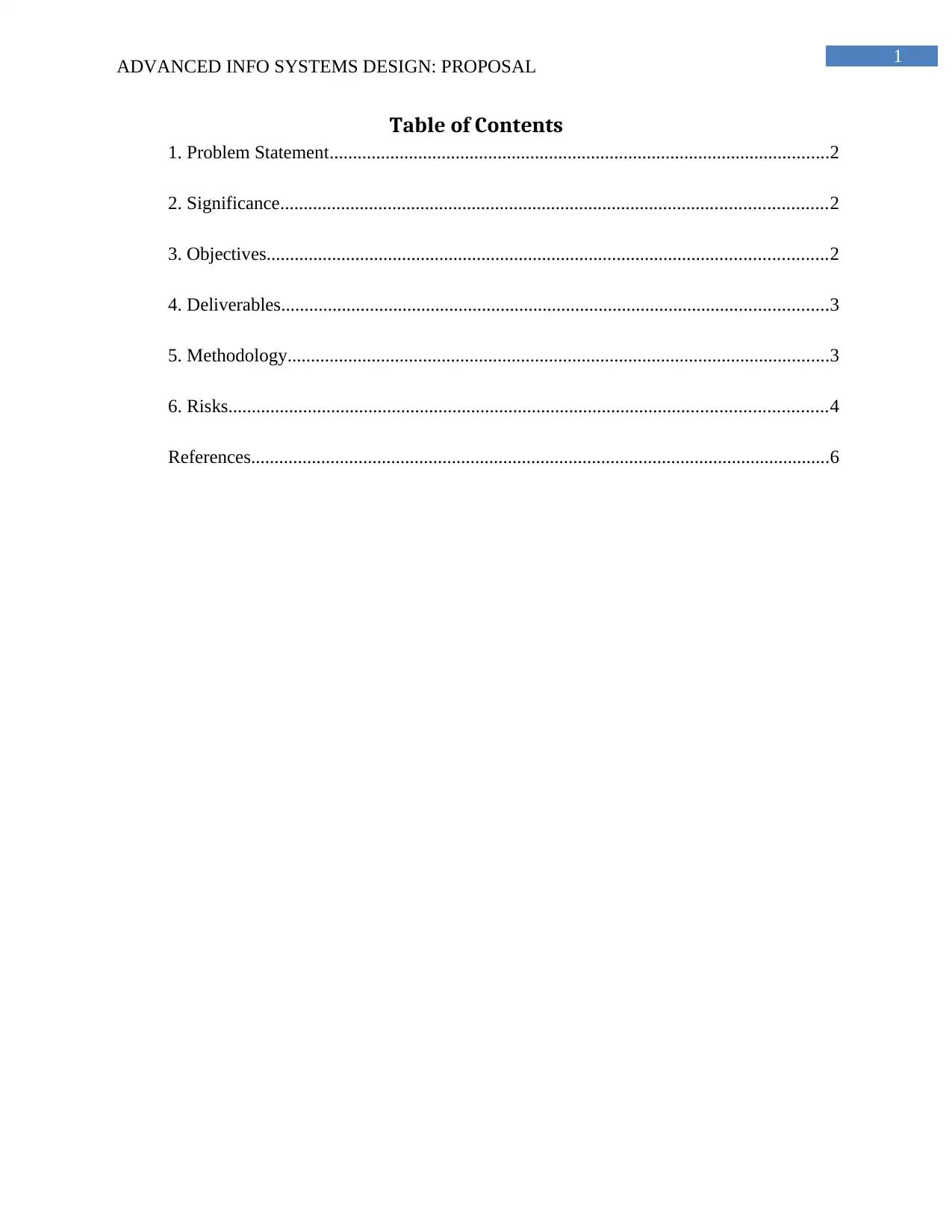
1
ADVANCED INFO SYSTEMS DESIGN: PROPOSAL
Table of Contents
1. Problem Statement...........................................................................................................2
2. Significance.....................................................................................................................2
3. Objectives........................................................................................................................2
4. Deliverables.....................................................................................................................3
5. Methodology....................................................................................................................3
6. Risks................................................................................................................................4
References............................................................................................................................6
ADVANCED INFO SYSTEMS DESIGN: PROPOSAL
Table of Contents
1. Problem Statement...........................................................................................................2
2. Significance.....................................................................................................................2
3. Objectives........................................................................................................................2
4. Deliverables.....................................................................................................................3
5. Methodology....................................................................................................................3
6. Risks................................................................................................................................4
References............................................................................................................................6
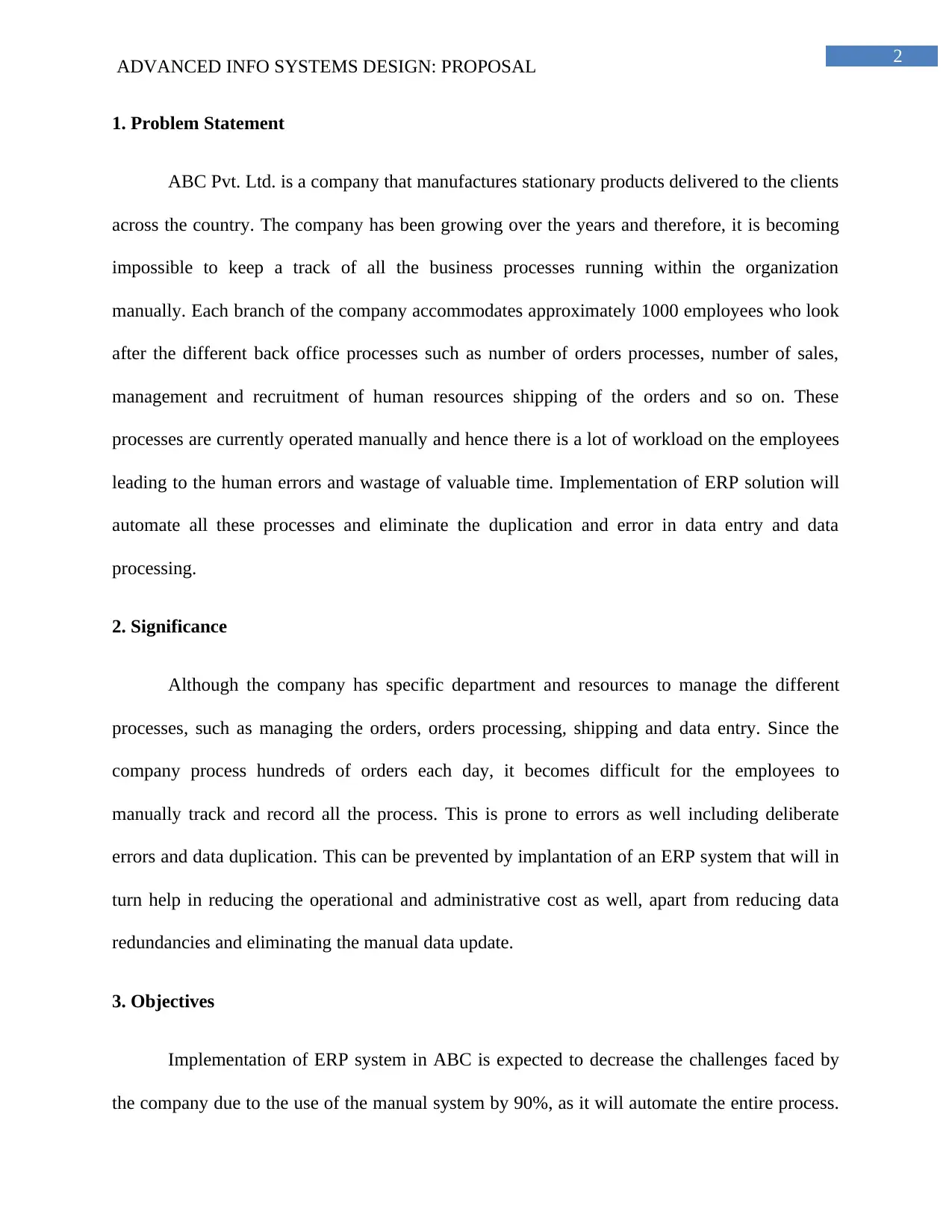
2
ADVANCED INFO SYSTEMS DESIGN: PROPOSAL
1. Problem Statement
ABC Pvt. Ltd. is a company that manufactures stationary products delivered to the clients
across the country. The company has been growing over the years and therefore, it is becoming
impossible to keep a track of all the business processes running within the organization
manually. Each branch of the company accommodates approximately 1000 employees who look
after the different back office processes such as number of orders processes, number of sales,
management and recruitment of human resources shipping of the orders and so on. These
processes are currently operated manually and hence there is a lot of workload on the employees
leading to the human errors and wastage of valuable time. Implementation of ERP solution will
automate all these processes and eliminate the duplication and error in data entry and data
processing.
2. Significance
Although the company has specific department and resources to manage the different
processes, such as managing the orders, orders processing, shipping and data entry. Since the
company process hundreds of orders each day, it becomes difficult for the employees to
manually track and record all the process. This is prone to errors as well including deliberate
errors and data duplication. This can be prevented by implantation of an ERP system that will in
turn help in reducing the operational and administrative cost as well, apart from reducing data
redundancies and eliminating the manual data update.
3. Objectives
Implementation of ERP system in ABC is expected to decrease the challenges faced by
the company due to the use of the manual system by 90%, as it will automate the entire process.
ADVANCED INFO SYSTEMS DESIGN: PROPOSAL
1. Problem Statement
ABC Pvt. Ltd. is a company that manufactures stationary products delivered to the clients
across the country. The company has been growing over the years and therefore, it is becoming
impossible to keep a track of all the business processes running within the organization
manually. Each branch of the company accommodates approximately 1000 employees who look
after the different back office processes such as number of orders processes, number of sales,
management and recruitment of human resources shipping of the orders and so on. These
processes are currently operated manually and hence there is a lot of workload on the employees
leading to the human errors and wastage of valuable time. Implementation of ERP solution will
automate all these processes and eliminate the duplication and error in data entry and data
processing.
2. Significance
Although the company has specific department and resources to manage the different
processes, such as managing the orders, orders processing, shipping and data entry. Since the
company process hundreds of orders each day, it becomes difficult for the employees to
manually track and record all the process. This is prone to errors as well including deliberate
errors and data duplication. This can be prevented by implantation of an ERP system that will in
turn help in reducing the operational and administrative cost as well, apart from reducing data
redundancies and eliminating the manual data update.
3. Objectives
Implementation of ERP system in ABC is expected to decrease the challenges faced by
the company due to the use of the manual system by 90%, as it will automate the entire process.
⊘ This is a preview!⊘
Do you want full access?
Subscribe today to unlock all pages.

Trusted by 1+ million students worldwide
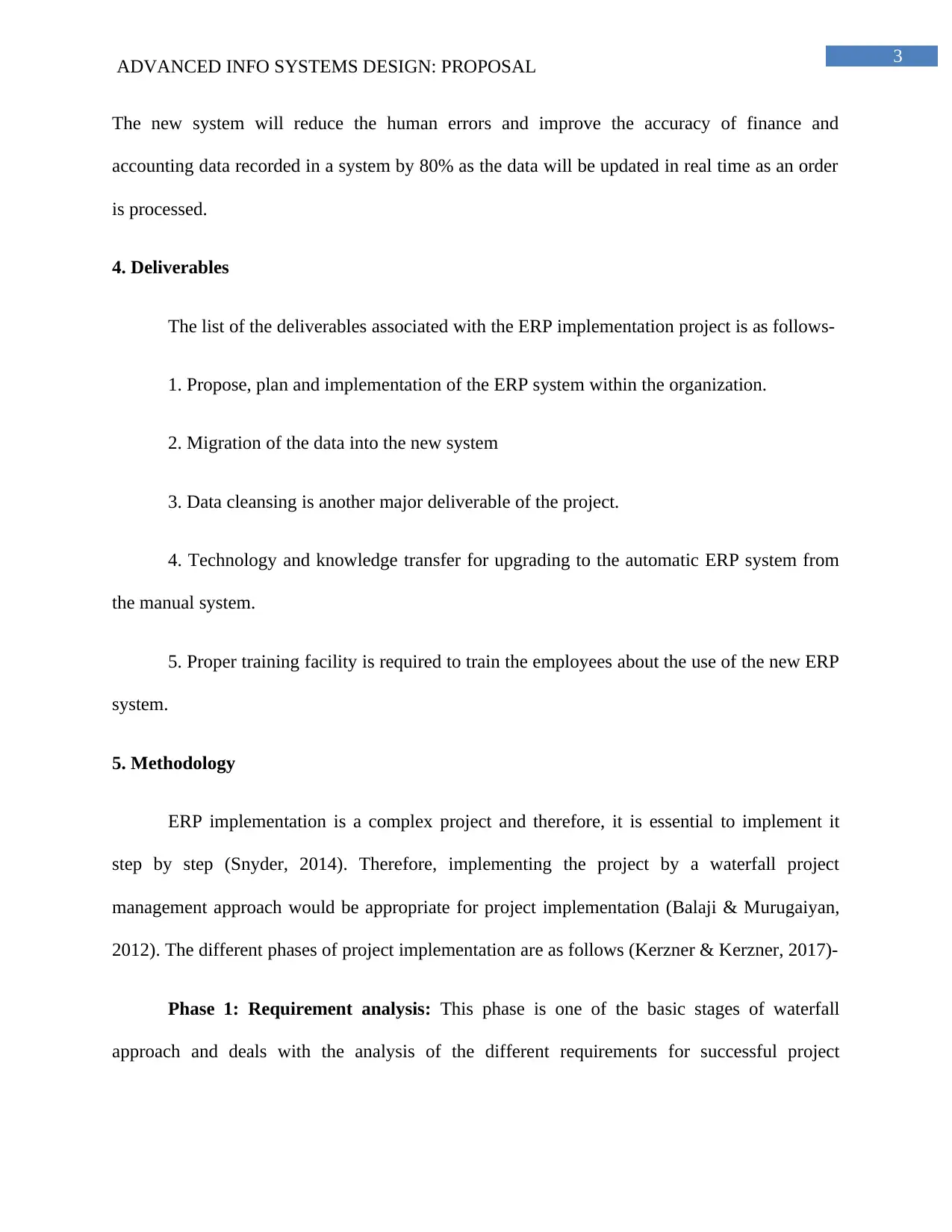
3
ADVANCED INFO SYSTEMS DESIGN: PROPOSAL
The new system will reduce the human errors and improve the accuracy of finance and
accounting data recorded in a system by 80% as the data will be updated in real time as an order
is processed.
4. Deliverables
The list of the deliverables associated with the ERP implementation project is as follows-
1. Propose, plan and implementation of the ERP system within the organization.
2. Migration of the data into the new system
3. Data cleansing is another major deliverable of the project.
4. Technology and knowledge transfer for upgrading to the automatic ERP system from
the manual system.
5. Proper training facility is required to train the employees about the use of the new ERP
system.
5. Methodology
ERP implementation is a complex project and therefore, it is essential to implement it
step by step (Snyder, 2014). Therefore, implementing the project by a waterfall project
management approach would be appropriate for project implementation (Balaji & Murugaiyan,
2012). The different phases of project implementation are as follows (Kerzner & Kerzner, 2017)-
Phase 1: Requirement analysis: This phase is one of the basic stages of waterfall
approach and deals with the analysis of the different requirements for successful project
ADVANCED INFO SYSTEMS DESIGN: PROPOSAL
The new system will reduce the human errors and improve the accuracy of finance and
accounting data recorded in a system by 80% as the data will be updated in real time as an order
is processed.
4. Deliverables
The list of the deliverables associated with the ERP implementation project is as follows-
1. Propose, plan and implementation of the ERP system within the organization.
2. Migration of the data into the new system
3. Data cleansing is another major deliverable of the project.
4. Technology and knowledge transfer for upgrading to the automatic ERP system from
the manual system.
5. Proper training facility is required to train the employees about the use of the new ERP
system.
5. Methodology
ERP implementation is a complex project and therefore, it is essential to implement it
step by step (Snyder, 2014). Therefore, implementing the project by a waterfall project
management approach would be appropriate for project implementation (Balaji & Murugaiyan,
2012). The different phases of project implementation are as follows (Kerzner & Kerzner, 2017)-
Phase 1: Requirement analysis: This phase is one of the basic stages of waterfall
approach and deals with the analysis of the different requirements for successful project
Paraphrase This Document
Need a fresh take? Get an instant paraphrase of this document with our AI Paraphraser
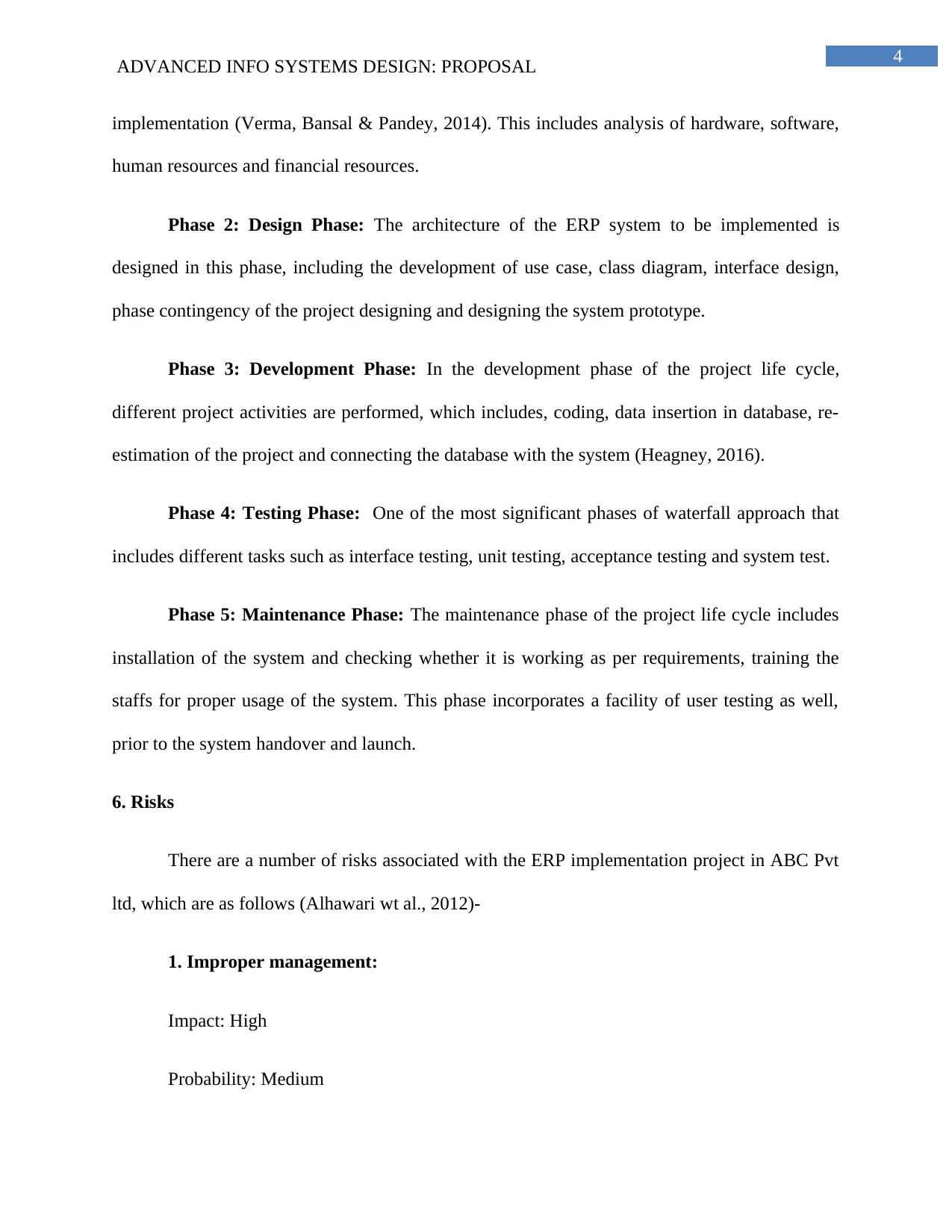
4
ADVANCED INFO SYSTEMS DESIGN: PROPOSAL
implementation (Verma, Bansal & Pandey, 2014). This includes analysis of hardware, software,
human resources and financial resources.
Phase 2: Design Phase: The architecture of the ERP system to be implemented is
designed in this phase, including the development of use case, class diagram, interface design,
phase contingency of the project designing and designing the system prototype.
Phase 3: Development Phase: In the development phase of the project life cycle,
different project activities are performed, which includes, coding, data insertion in database, re-
estimation of the project and connecting the database with the system (Heagney, 2016).
Phase 4: Testing Phase: One of the most significant phases of waterfall approach that
includes different tasks such as interface testing, unit testing, acceptance testing and system test.
Phase 5: Maintenance Phase: The maintenance phase of the project life cycle includes
installation of the system and checking whether it is working as per requirements, training the
staffs for proper usage of the system. This phase incorporates a facility of user testing as well,
prior to the system handover and launch.
6. Risks
There are a number of risks associated with the ERP implementation project in ABC Pvt
ltd, which are as follows (Alhawari wt al., 2012)-
1. Improper management:
Impact: High
Probability: Medium
ADVANCED INFO SYSTEMS DESIGN: PROPOSAL
implementation (Verma, Bansal & Pandey, 2014). This includes analysis of hardware, software,
human resources and financial resources.
Phase 2: Design Phase: The architecture of the ERP system to be implemented is
designed in this phase, including the development of use case, class diagram, interface design,
phase contingency of the project designing and designing the system prototype.
Phase 3: Development Phase: In the development phase of the project life cycle,
different project activities are performed, which includes, coding, data insertion in database, re-
estimation of the project and connecting the database with the system (Heagney, 2016).
Phase 4: Testing Phase: One of the most significant phases of waterfall approach that
includes different tasks such as interface testing, unit testing, acceptance testing and system test.
Phase 5: Maintenance Phase: The maintenance phase of the project life cycle includes
installation of the system and checking whether it is working as per requirements, training the
staffs for proper usage of the system. This phase incorporates a facility of user testing as well,
prior to the system handover and launch.
6. Risks
There are a number of risks associated with the ERP implementation project in ABC Pvt
ltd, which are as follows (Alhawari wt al., 2012)-
1. Improper management:
Impact: High
Probability: Medium
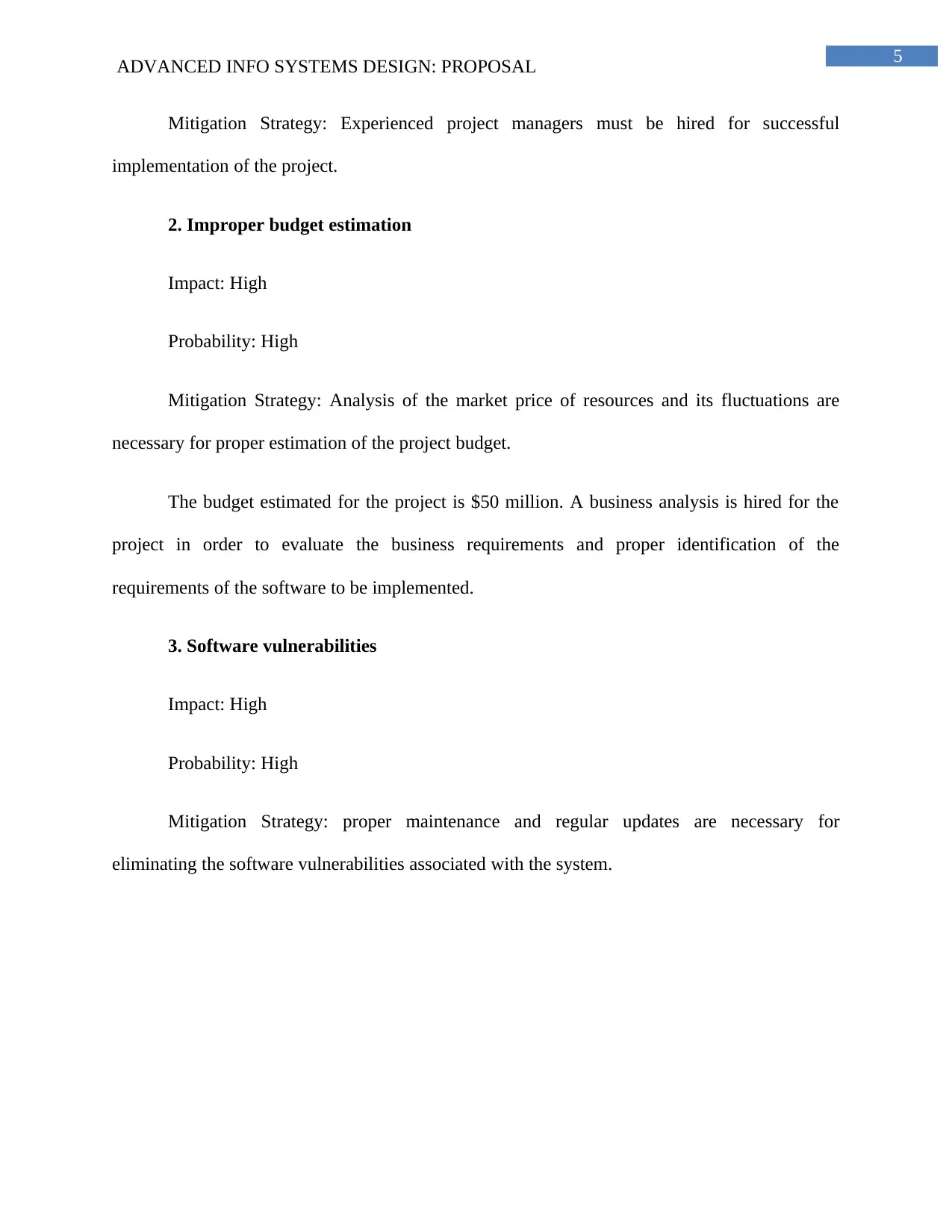
5
ADVANCED INFO SYSTEMS DESIGN: PROPOSAL
Mitigation Strategy: Experienced project managers must be hired for successful
implementation of the project.
2. Improper budget estimation
Impact: High
Probability: High
Mitigation Strategy: Analysis of the market price of resources and its fluctuations are
necessary for proper estimation of the project budget.
The budget estimated for the project is $50 million. A business analysis is hired for the
project in order to evaluate the business requirements and proper identification of the
requirements of the software to be implemented.
3. Software vulnerabilities
Impact: High
Probability: High
Mitigation Strategy: proper maintenance and regular updates are necessary for
eliminating the software vulnerabilities associated with the system.
ADVANCED INFO SYSTEMS DESIGN: PROPOSAL
Mitigation Strategy: Experienced project managers must be hired for successful
implementation of the project.
2. Improper budget estimation
Impact: High
Probability: High
Mitigation Strategy: Analysis of the market price of resources and its fluctuations are
necessary for proper estimation of the project budget.
The budget estimated for the project is $50 million. A business analysis is hired for the
project in order to evaluate the business requirements and proper identification of the
requirements of the software to be implemented.
3. Software vulnerabilities
Impact: High
Probability: High
Mitigation Strategy: proper maintenance and regular updates are necessary for
eliminating the software vulnerabilities associated with the system.
⊘ This is a preview!⊘
Do you want full access?
Subscribe today to unlock all pages.

Trusted by 1+ million students worldwide
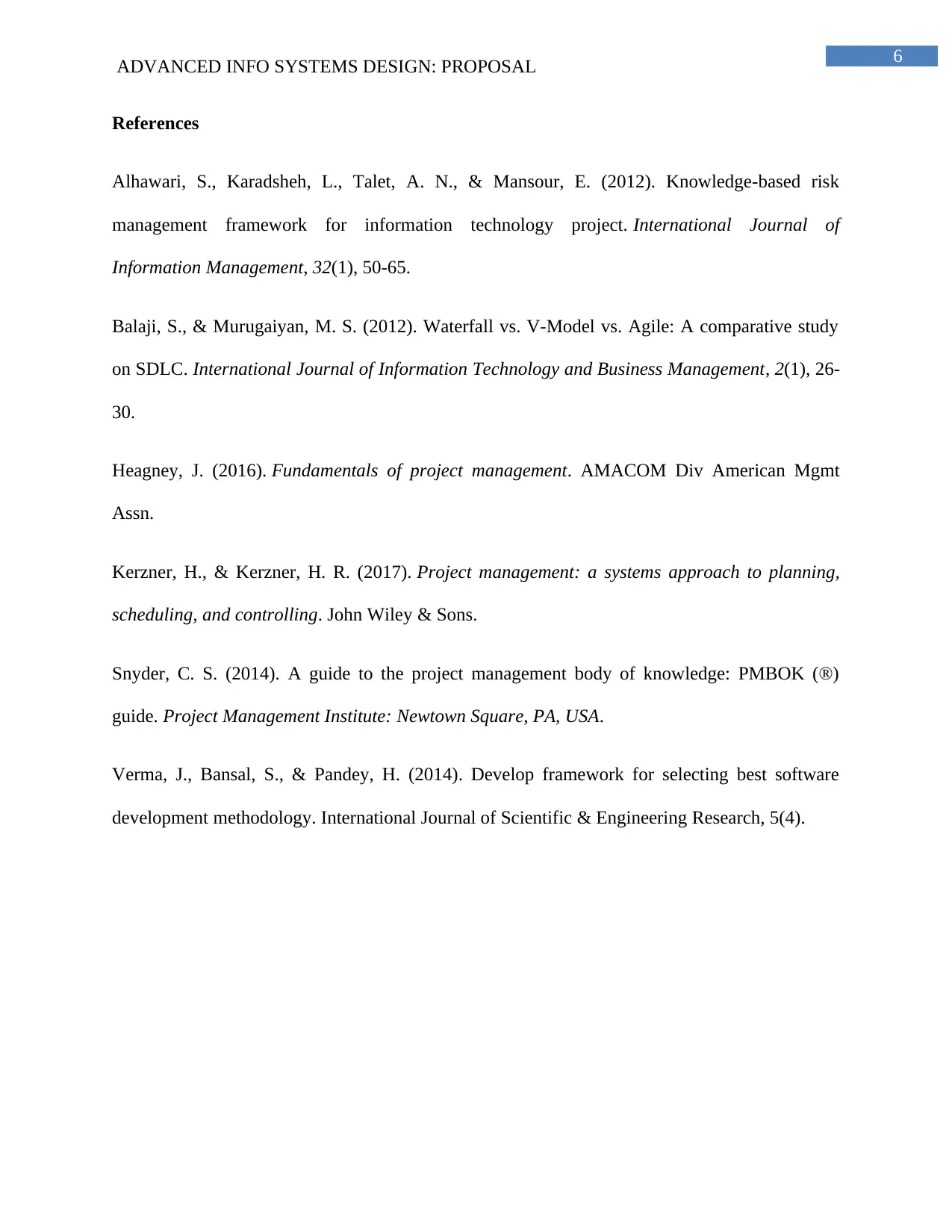
6
ADVANCED INFO SYSTEMS DESIGN: PROPOSAL
References
Alhawari, S., Karadsheh, L., Talet, A. N., & Mansour, E. (2012). Knowledge-based risk
management framework for information technology project. International Journal of
Information Management, 32(1), 50-65.
Balaji, S., & Murugaiyan, M. S. (2012). Waterfall vs. V-Model vs. Agile: A comparative study
on SDLC. International Journal of Information Technology and Business Management, 2(1), 26-
30.
Heagney, J. (2016). Fundamentals of project management. AMACOM Div American Mgmt
Assn.
Kerzner, H., & Kerzner, H. R. (2017). Project management: a systems approach to planning,
scheduling, and controlling. John Wiley & Sons.
Snyder, C. S. (2014). A guide to the project management body of knowledge: PMBOK (®)
guide. Project Management Institute: Newtown Square, PA, USA.
Verma, J., Bansal, S., & Pandey, H. (2014). Develop framework for selecting best software
development methodology. International Journal of Scientific & Engineering Research, 5(4).
ADVANCED INFO SYSTEMS DESIGN: PROPOSAL
References
Alhawari, S., Karadsheh, L., Talet, A. N., & Mansour, E. (2012). Knowledge-based risk
management framework for information technology project. International Journal of
Information Management, 32(1), 50-65.
Balaji, S., & Murugaiyan, M. S. (2012). Waterfall vs. V-Model vs. Agile: A comparative study
on SDLC. International Journal of Information Technology and Business Management, 2(1), 26-
30.
Heagney, J. (2016). Fundamentals of project management. AMACOM Div American Mgmt
Assn.
Kerzner, H., & Kerzner, H. R. (2017). Project management: a systems approach to planning,
scheduling, and controlling. John Wiley & Sons.
Snyder, C. S. (2014). A guide to the project management body of knowledge: PMBOK (®)
guide. Project Management Institute: Newtown Square, PA, USA.
Verma, J., Bansal, S., & Pandey, H. (2014). Develop framework for selecting best software
development methodology. International Journal of Scientific & Engineering Research, 5(4).
1 out of 7
Related Documents
Your All-in-One AI-Powered Toolkit for Academic Success.
+13062052269
info@desklib.com
Available 24*7 on WhatsApp / Email
![[object Object]](/_next/static/media/star-bottom.7253800d.svg)
Unlock your academic potential
Copyright © 2020–2026 A2Z Services. All Rights Reserved. Developed and managed by ZUCOL.



